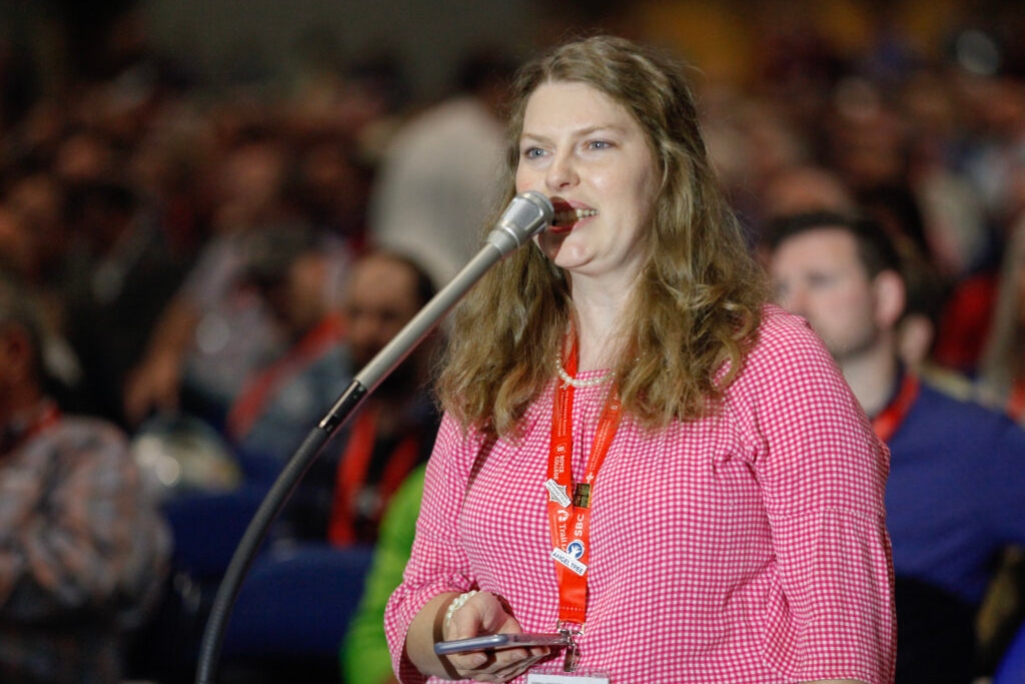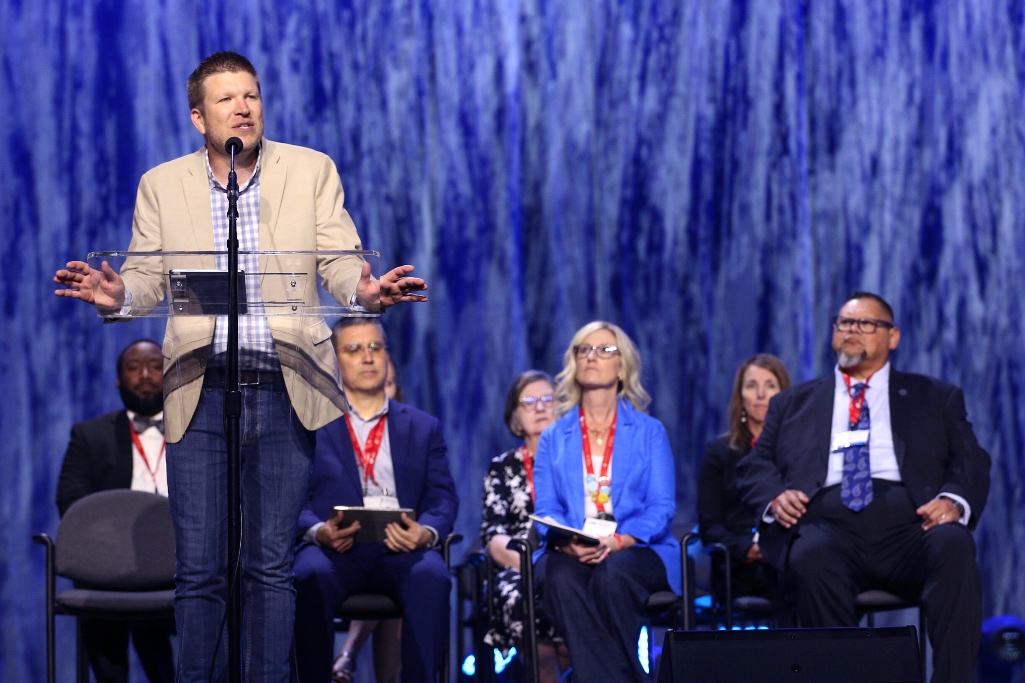
SBC messenger Chelsea McReynolds of Oklahoma makes a motion regarding making changes to the Baptist Faith and Message. Her motion was referred to the SBC Executive Committee.
NASHVILLE (BP) — The Baptist Faith and Message (BF&M) soon could be more difficult to amend. That’s a good thing, says the Southern Baptist Convention (SBC) messenger whose motion this summer in Indianapolis helped initiate the change.
“We have enough division in our denomination without the instability of our foundational confessional document,” said Chelsea McReynolds, the pastor’s wife and women’s ministry leader at Chandler (Okla.) Southern Baptist Church. “If it is too easy to amend, our core doctrines could shift based on temporary trends or majority whims. Such fluidity could cause confusion among church members and undermine the theological foundations built by our forefathers.”
SBC messengers in Dallas next June will receive a recommendation from the convention’s Executive Committee (EC) to give the first of two required approvals to stiffen requirements for amending the BF&M, Southern Baptists’ confession of faith. The EC voted Sept. 17 to recommend that messengers amend the SBC Constitution to require two-thirds votes at two consecutive SBC annual meetings to amend the BF&M — the same requirement that exists for amending the SBC Constitution.
Two actions at the 2024 SBC annual meeting in Indianapolis spurred the EC to consider BF&M amendments. One was McReynolds’ motion that the convention require a two-thirds majority for all BF&M alterations. The other was a recommendation from the convention’s ad hoc Cooperation Group that “edits or amendments to The Baptist Faith & Message follow the same process as amendments to the constitution (two-thirds vote, two consecutive years).”
Southern Baptists began discussing the process for BF&M amendments following a 2023 edit to the confession of faith that some viewed as hasty. That year, messenger Jared Cornutt, pastor of North Shelby Baptist Church in Birmingham, Ala., moved that the terms “elder” and “overseer” be listed as synonyms for pastor in Article 6. The Committee on Order of Business believed the motion’s wording required that they schedule it for debate during that very meeting. They did, and messengers voted to amend the BF&M as Cornutt suggested during the meeting’s final session on Wednesday afternoon.
The quick amendment to a foundational document led many, including Cornutt, to raise questions.
“Amending our confession from the floor on a Wednesday afternoon, when our messengers are experiencing ‘delegate fatigue syndrome’ (credit to parliamentarian Al Gage), is like doing surgery on the dining room table with a pocketknife and a flashlight,” Cornutt wrote in a Baptist Press column. “You might get the bullet out (or in this case, the benign tumor), but you’re taking a lot of risks along the way. And why take those risks when you have a team of experienced surgeons and a sterile operating room next door?”
Albert Mohler, president of the Southern Baptist Theological Seminary, said the amendment helped clarify what Southern Baptists believe about the office of pastor, but he thought sudden changes to the BF&M could have a negative impact on SBC entities. The entities include BF&M language in some employees’ contracts, he said, and need time to change legal and business documents.
A quick change could have “charter implications” as “SBC entities are fully accountable to the Baptist Faith and Message,” Mohler said.
Yet tightening the requirements for BF&M amendments is not just a matter of denominational polity, McReynolds said. It also affects local churches.
“Local church constitutions also utilize the BF&M to communicate their beliefs and as part of their governing documents,” she said. “Every change to the BF&M essentially requires each of our churches to personally accept or deny the change. There is already an issue in which edition of the BF&M one most closely aligns with. It is not unifying to further complicate the document over a foundationally insignificant change.”
The proposal for BF&M amendments will come before messengers during the EC report at the June 10-11 2025 SBC annual meeting in Dallas.
(EDITOR’S NOTE — David Roach is a writer in Mobile, Ala.)


